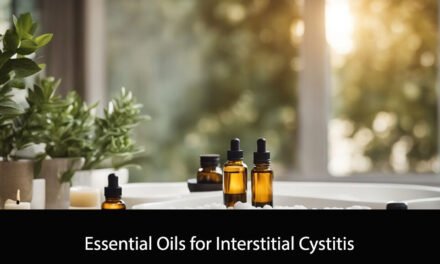Car sickness, also known as motion sickness, is a common problem that affects many people. It can occur when traveling by car, boat, or plane, and can cause symptoms such as nausea, vomiting, dizziness, and headaches. While there are several over-the-counter medications available to help relieve these symptoms, some people prefer to use natural remedies such as essential oils.
Essential oils are highly concentrated plant extracts that are known for their therapeutic properties. They have been used for centuries to treat a wide range of health issues, including nausea and motion sickness. When inhaled or applied topically, certain essential oils can help to calm the mind and body, reduce nausea and vomiting, and ease dizziness and headaches.
In this article, we will explore some of the best essential oils for car sickness and how to use them effectively. We will also discuss the science behind how essential oils work, as well as some tips for preventing car sickness in the first place. Whether you’re planning a long road trip or just need relief from your daily commute, these natural remedies may be just what you need to stay comfortable and nausea-free.
Understanding Car Sickness

Car sickness, also known as motion sickness, is a common problem that affects many people. It is caused by the motion of a moving vehicle, such as a car, boat, or airplane, that disrupts the inner ear’s balance system. This can lead to symptoms such as nausea, dizziness, sweating, and vomiting.
Causes of Car Sickness
Car sickness occurs when the brain receives conflicting signals from the eyes and inner ear. The eyes perceive that the body is stationary, while the inner ear senses the motion of the vehicle. This mismatch of signals can cause the brain to become confused and lead to the symptoms of car sickness.
Other factors that can contribute to car sickness include:
- Poor ventilation or strong odors in the vehicle
- Anxiety or stress
- Reading or looking at a screen while in motion
- Sitting in the backseat of a car or facing backward
How Essential Oils Can Help
Essential oils have been used for centuries to treat a wide range of ailments, including motion sickness. Certain oils, such as peppermint, ginger, and lavender, have properties that can help alleviate the symptoms of car sickness.
Peppermint oil has a cooling and soothing effect that can help relieve nausea and dizziness. Ginger oil has anti-inflammatory properties that can help reduce inflammation in the inner ear and alleviate symptoms. Lavender oil has a calming effect that can help reduce anxiety and stress, which can contribute to car sickness.
To use essential oils for car sickness, you can apply them topically or use a diffuser. Dilute the oil in a carrier oil, such as coconut or jojoba oil, before applying it to the skin. You can also add a few drops of the oil to a diffuser and inhale the aroma.
In conclusion, car sickness can be a frustrating and uncomfortable problem, but essential oils can be a natural and effective way to alleviate the symptoms. By understanding the causes of car sickness and using essential oils, you can enjoy a more comfortable and enjoyable journey.
Best Essential Oils for Car Sickness

Car sickness can be a debilitating and uncomfortable experience for many people. Essential oils can be a natural and effective way to alleviate symptoms of car sickness. Here are the best essential oils for car sickness:
Ginger Oil
Ginger oil is known for its ability to soothe upset stomachs and reduce nausea. It has been used for centuries to treat motion sickness and is a popular choice for those looking for a natural remedy. Ginger oil can be applied topically or inhaled through a diffuser.
Peppermint Oil
Peppermint oil is a refreshing and invigorating scent that can help reduce symptoms of car sickness. It has a cooling effect that can ease nausea and vomiting. Peppermint oil can be applied topically or inhaled through a diffuser.
Lavender Oil
Lavender oil is a calming and relaxing scent that can help reduce anxiety and motion sickness. It has a soothing effect on the nervous system and can help alleviate symptoms such as nausea and dizziness. Lavender oil can be applied topically or inhaled through a diffuser.
Spearmint Oil
Spearmint oil has a refreshing and uplifting scent that can help reduce symptoms of car sickness. It has a cooling effect that can ease nausea and vomiting. Spearmint oil can be applied topically or inhaled through a diffuser.
Chamomile Oil
Chamomile oil is a calming and soothing scent that can help reduce anxiety and motion sickness. It has a relaxing effect on the nervous system and can help alleviate symptoms such as nausea and dizziness. Chamomile oil can be applied topically or inhaled through a diffuser.
In conclusion, essential oils can be a natural and effective way to alleviate symptoms of car sickness. Ginger oil, peppermint oil, lavender oil, spearmint oil, and chamomile oil are the best essential oils for car sickness. Try incorporating these oils into your daily routine to help reduce symptoms and improve your overall well-being.
Methods of Using Essential Oils

Inhalation Techniques
Inhaling essential oils is one of the most effective ways to alleviate car sickness symptoms. We recommend using a personal inhaler or a few drops of essential oil on a tissue or cloth. Simply inhale the aroma deeply for a few minutes. Peppermint, ginger, and lavender essential oils are popular choices for inhalation.
Topical Applications
Topical application of essential oils can also help relieve car sickness symptoms. We recommend diluting essential oils with a carrier oil such as coconut oil or jojoba oil before applying to the skin. Apply the diluted oil to the temples, wrists, or behind the ears. Peppermint, ginger, and lavender essential oils are also popular choices for topical application.
Aromatherapy Diffusers for Cars
Aromatherapy diffusers for cars are a convenient way to use essential oils while driving. We recommend using a diffuser that plugs into the car’s cigarette lighter. Add a few drops of essential oil to the diffuser and let it run while driving. Peppermint, ginger, and lavender essential oils are also popular choices for aromatherapy diffusers in cars.
Overall, using essential oils is a natural and effective way to alleviate car sickness symptoms. By using inhalation techniques, topical applications, or aromatherapy diffusers for cars, you can enjoy a more comfortable and enjoyable car ride.
Safety and Precautions
When using essential oils for car sickness, it is important to keep in mind some safety and precautionary measures to ensure that you are using them correctly and safely.
Proper Dilution
Essential oils are highly concentrated and should always be diluted before use. We recommend using a carrier oil such as coconut or sweet almond oil to dilute the essential oil. A general rule of thumb is to use one drop of essential oil per teaspoon of carrier oil. This will help prevent skin irritation and other adverse reactions.
Avoiding Skin Sensitivity
Some essential oils can cause skin sensitivity or irritation. We recommend performing a patch test before using any new essential oil. Simply apply a small amount of the diluted oil to the inside of your wrist and wait 24 hours to see if any redness or irritation occurs. If you experience any adverse reactions, discontinue use immediately.
Using Essential Oils with Children
It is important to exercise caution when using essential oils with children. Essential oils should never be ingested and should always be diluted before use. We recommend consulting with a healthcare professional before using essential oils on children, especially infants and toddlers. Some essential oils may not be safe for use on children, and certain oils may require lower dilution ratios.
By following these safety and precautionary measures, you can safely and effectively use essential oils for car sickness relief.
Creating Blends for Car Sickness
If you are prone to car sickness, essential oils can be a natural and effective remedy. By creating your own blends, you can customize the scents to suit your preferences and needs. Here are some recipes to get you started.
Recipe for Nausea Relief
This blend is designed to ease nausea and promote relaxation. Combine the following essential oils in a rollerball bottle and fill with a carrier oil such as fractionated coconut oil:
- 5 drops of ginger essential oil
- 5 drops of peppermint essential oil
- 5 drops of lavender essential oil
Apply the blend to your wrists, temples, and behind your ears as needed.
Calming Blend Recipe
This blend is perfect for those who experience anxiety or stress while traveling. Combine the following essential oils in a diffuser or inhaler:
- 3 drops of bergamot essential oil
- 3 drops of lavender essential oil
- 2 drops of ylang-ylang essential oil
Inhale the scent deeply or diffuse in your car as needed.
Energizing Blend for Focus
If you need to stay alert and focused during a long car ride, this blend can help. Combine the following essential oils in a diffuser or inhaler:
- 3 drops of peppermint essential oil
- 3 drops of rosemary essential oil
- 2 drops of lemon essential oil
Inhale the scent deeply or diffuse in your car to stay energized and focused.
Remember to always use high-quality essential oils and consult with a healthcare professional before using if you are pregnant, nursing, or have any medical conditions.
Alternative Remedies and Supports

Acupressure and Acupuncture
Acupressure and acupuncture are ancient Chinese practices that can help alleviate nausea and vomiting associated with car sickness. These practices involve stimulating specific pressure points on the body to balance the flow of energy and promote healing.
Acupressure can be self-administered by applying pressure to specific points on the body, such as the wrist, behind the ear, and on the inner forearm. Acupuncture, on the other hand, involves the insertion of fine needles into specific points on the body. Both practices can be effective in reducing the symptoms of car sickness.
Dietary Adjustments
Making dietary adjustments can also help prevent car sickness. It is recommended to avoid heavy meals before traveling and to eat light, frequent meals throughout the day. Foods that are high in protein and low in carbohydrates can also help prevent nausea and vomiting.
Ginger is a natural remedy that has been shown to be effective in reducing the symptoms of car sickness. It can be consumed in various forms, such as ginger tea, ginger ale, or ginger candies.
Staying Hydrated
Staying hydrated is important when traveling, especially when experiencing car sickness. Dehydration can worsen the symptoms of nausea and vomiting. It is recommended to drink plenty of water and to avoid caffeine and alcohol, which can dehydrate the body.
In addition to water, electrolyte drinks can also help replenish fluids and minerals lost during travel. These drinks can be found at most convenience stores and gas stations.
By incorporating these alternative remedies and supports into our travel routine, we can reduce the symptoms of car sickness and enjoy a more comfortable journey.
Frequently Asked Questions
What essential oils can alleviate nausea during car rides?
There are several essential oils that can help alleviate nausea during car rides, including ginger, peppermint, and lavender. These oils can be inhaled directly from the bottle, or diluted with a carrier oil and applied topically to the skin.
How should essential oils be used in a diffuser to prevent car sickness?
To prevent car sickness with essential oils, add a few drops of your chosen oil to a diffuser and place it in your car. Alternatively, you can add a few drops to a cotton ball and place it in a cup holder or other secure location in your car.
Can peppermint oil be effective for treating nausea, and what is the proper way to use it?
Peppermint oil has been shown to be effective in treating nausea and can be used by inhaling it directly from the bottle or by adding a few drops to a diffuser. It can also be diluted with a carrier oil and applied topically to the skin, but should be avoided on sensitive areas such as the face and neck.
Which essential oils offered by doTERRA are recommended for combating motion sickness?
doTERRA offers several essential oils that can help combat motion sickness, including DigestZen, Peppermint, and Ginger. These oils can be used in a diffuser or applied topically to the skin.
Are there specific Young Living essential oils that help with nausea and dizziness while traveling?
Young Living offers several essential oils that can help with nausea and dizziness while traveling, including Peppermint, Ginger, and DiGize. These oils can be used in a diffuser or applied topically to the skin.
What are the most effective methods to quickly relieve car sickness symptoms with essential oils?
The most effective methods to quickly relieve car sickness symptoms with essential oils are inhalation and topical application. Inhaling the oil directly from the bottle or from a diffuser can provide quick relief, while applying the oil topically to the skin can provide longer-lasting relief. It is important to dilute the oil with a carrier oil before applying it topically to avoid skin irritation.





